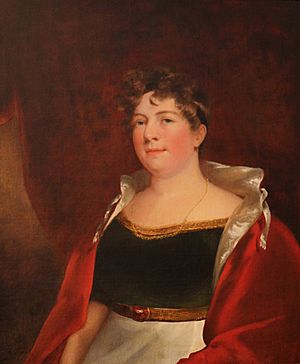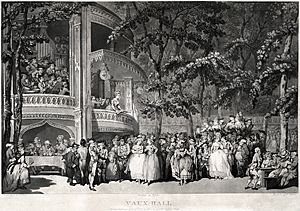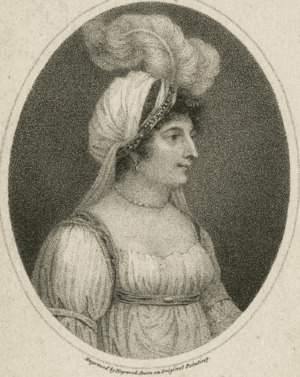Elizabeth Billington facts for kids
Quick facts for kids
Elizabeth Billington
|
|
|---|---|

|
|
| Born |
Elizabeth Weichsel
1765 |
| Died | 25 August 1818 |
| Occupation | opera singer |
Elizabeth Billington (born 27 December 1765, died 25 August 1818) was a famous British opera singer. She was known for her incredible voice and became one of the most celebrated singers of her time.
Contents
Elizabeth Billington's Musical Journey
Early Life and First Steps in Music
Elizabeth Weichsel was born on 27 December 1765 in London. Her father, Carl Weichsel, was a talented oboe player from Germany. Her mother, Frederika, was an English singer who performed successfully at Vauxhall Gardens.
Elizabeth and her brother Charles learned music from their father. She started playing the piano at a very young age. By 1774, when she was just eight years old, she performed at a concert for her mother. She also studied with a famous musician named Johann Samuel Schroeter. Before she turned twelve, Elizabeth had already published two sets of piano sonatas. Soon, she began to focus on singing. At only fourteen, she sang in a public concert in Oxford.
Rising to Stardom on Stage
On 13 October 1783, Elizabeth married James Billington, a double-bass player who had also taught her singing. Right after their wedding, they moved to Dublin, Ireland. There, Elizabeth made her first stage appearance as Eurydice in an opera.
After singing in other Irish towns, she returned to London in 1786. She was offered a short engagement at the Covent Garden theatre. Elizabeth insisted on a longer contract, and she got it. She debuted on 13 February 1786, performing as Rosetta in Thomas Arne's opera Love in a Village. Her performances were so popular that she was hired for the rest of the season.
People at the time said she had a sweet, powerful, and wide-ranging voice. She was also described as beautiful and charming. Her secret to success was her dedication to practice. She worked hard to improve her singing, even though some said her voice wasn't great at first.
Studying and Performing in Europe
After her first successful season, Elizabeth went to Paris to study with the famous composer Antonio Sacchini. She also learned from other great teachers throughout her career. She returned to London for many seasons, singing at Covent Garden and other major music events until 1793.
Many composers wrote operas especially for her. William Shield wrote 'Marian' and 'The Prophet'. She also starred as Yarico in Dr. Arnold's popular opera 'Inkle and Yarico'. Some of her favorite roles included Mandane in 'Artaxerxes' and characters in 'Polly' and 'The Duenna'.
In 1794, Elizabeth left England and traveled through Germany to Italy with her brother and husband. In Naples, she was asked to sing for the royal family. This led to her performing at the San Carlo theatre in a new opera called 'Inez di Castro'. Her singing made a huge impression.
She stayed in Naples for sixteen months, then sang in other Italian cities like Florence, Milan, and Venice. In 1797, she became very ill in Venice. When she recovered, the opera house was lit up for three nights to celebrate her return. In Milan, she was warmly welcomed by Joséphine de Beauharnais, who later became Empress of France.
Returning to London and Retirement
In 1799, Elizabeth married a Frenchman named M. Felissent. She bought an estate near Venice, but her second marriage became very difficult. In 1801, she left her husband and returned to England.
Her return caused great excitement in the music world. Both Covent Garden and Drury Lane theatres wanted her to sing. She agreed to perform at both, earning a very high salary. Her first performance back in London was on 3 October 1801, in Thomas Arne's Artaxerxes. She sang the part of Mandane.
Elizabeth Billington earned a lot of money during this time. In 1802, she sang in Italian opera at the King's Theatre. She even performed a duet with her great rival, Mara, at a farewell concert. She continued to sing in Italian operas until her retirement in 1811. Peter Winter wrote his opera 'Calypso' for her. In 1806, she helped bring Wolfgang Amadeus Mozart's opera La Clemenza di Tito to England for the first time.
After suffering from poor health, she retired from singing. Her last announced performance was on 3 May 1811. However, she sang one more time in 1814 at a charity concert. After retiring, she lived a grand life at her villa in Fulham. In 1817, she reunited with her husband and moved near Venice, where she passed away on 25 August 1818.
 | Calvin Brent |
 | Walter T. Bailey |
 | Martha Cassell Thompson |
 | Alberta Jeannette Cassell |



